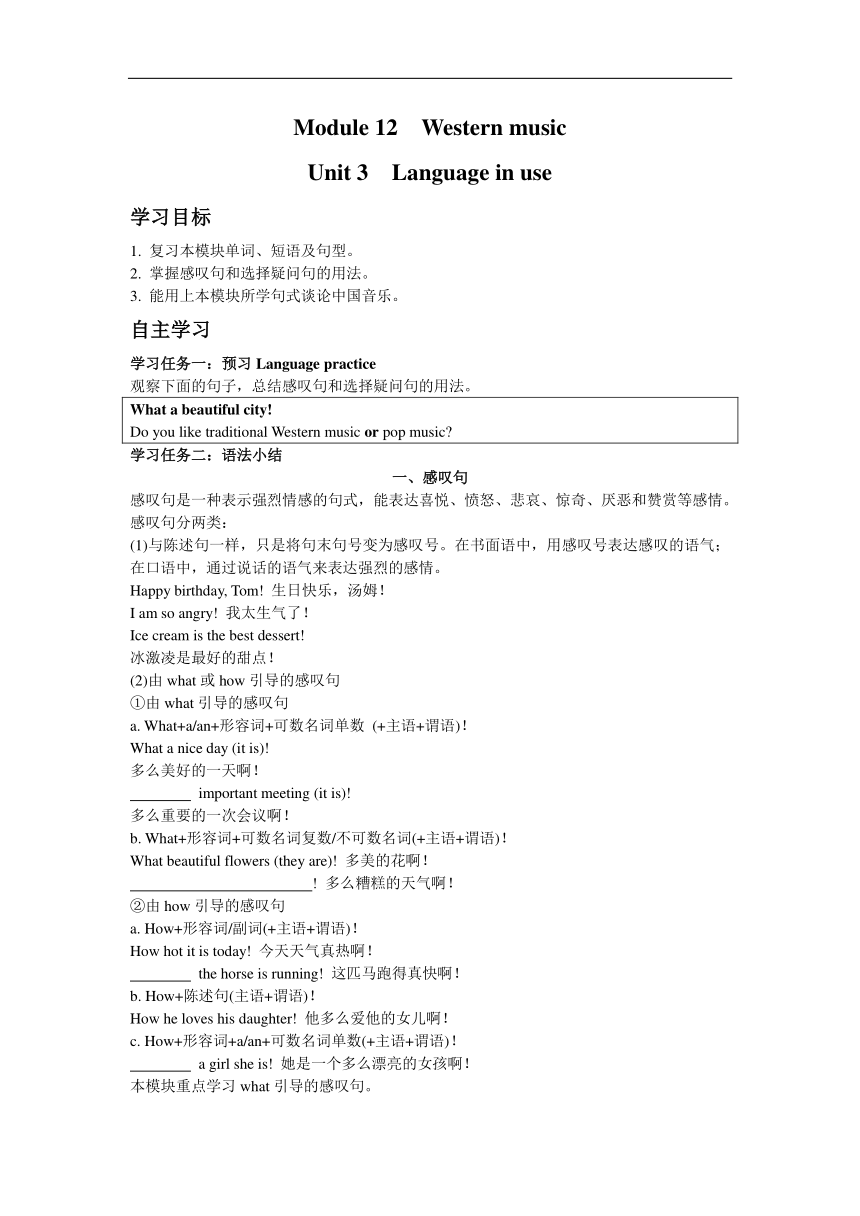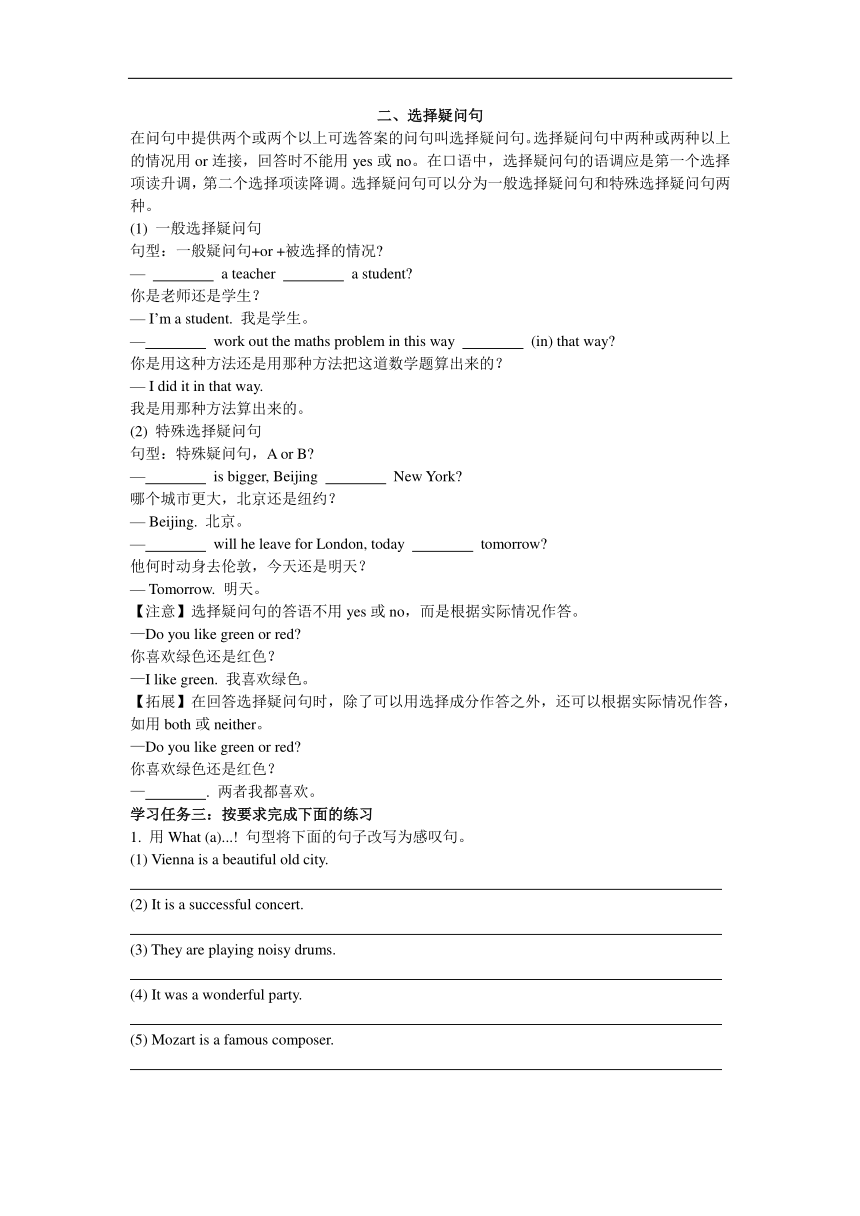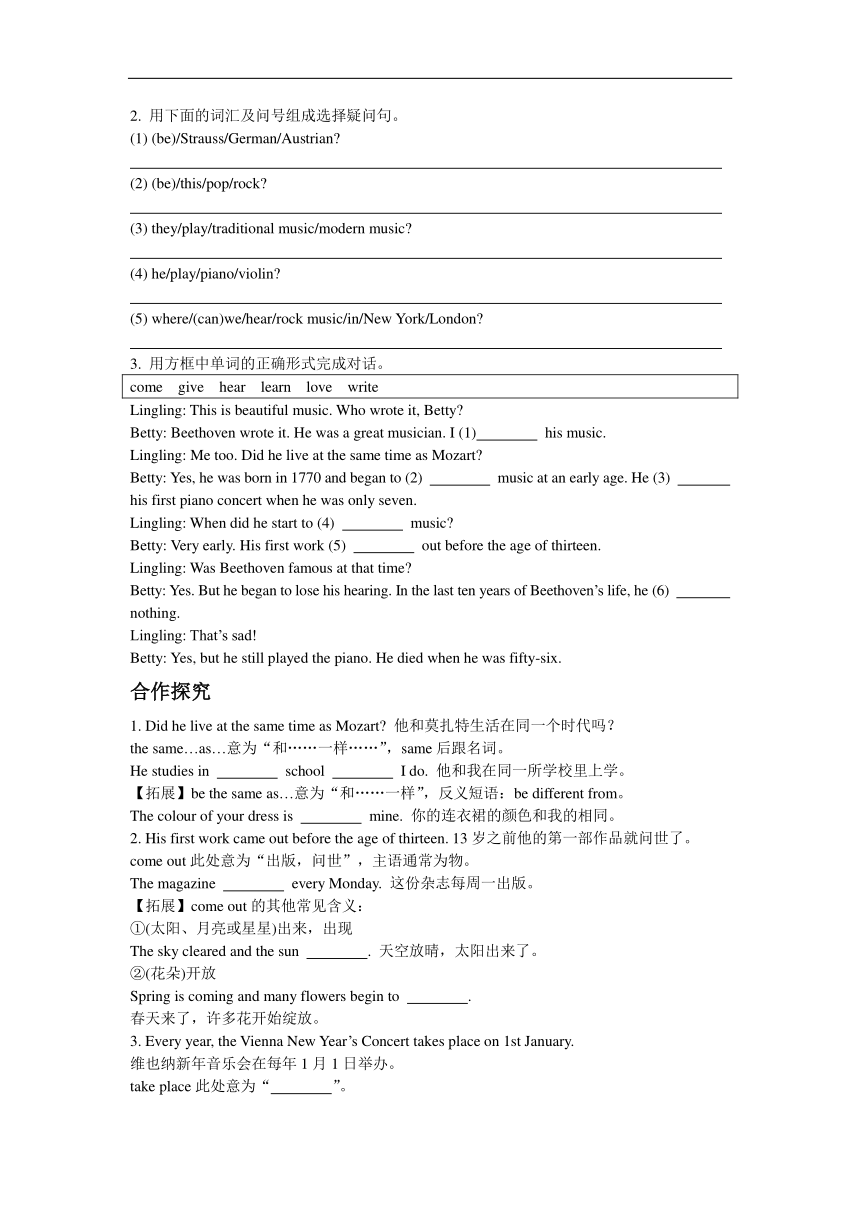Module 12 Unit 3同步学案-外语教研版中学英语七年级下
文档属性
| 名称 | Module 12 Unit 3同步学案-外语教研版中学英语七年级下 |

|
|
| 格式 | docx | ||
| 文件大小 | 34.4KB | ||
| 资源类型 | 试卷 | ||
| 版本资源 | 外研版 | ||
| 科目 | 英语 | ||
| 更新时间 | 2024-02-21 19:17:34 | ||
图片预览



文档简介
Module 12 Western music
Unit 3 Language in use
学习目标
1. 复习本模块单词、短语及句型。
2. 掌握感叹句和选择疑问句的用法。
3. 能用上本模块所学句式谈论中国音乐。
自主学习
学习任务一:预习Language practice
观察下面的句子,总结感叹句和选择疑问句的用法。
What a beautiful city! Do you like traditional Western music or pop music
学习任务二:语法小结
一、感叹句
感叹句是一种表示强烈情感的句式,能表达喜悦、愤怒、悲哀、惊奇、厌恶和赞赏等感情。感叹句分两类:
(1)与陈述句一样,只是将句末句号变为感叹号。在书面语中,用感叹号表达感叹的语气;在口语中,通过说话的语气来表达强烈的感情。
Happy birthday, Tom! 生日快乐,汤姆!
I am so angry! 我太生气了!
Ice cream is the best dessert!
冰激凌是最好的甜点!
(2)由what或how引导的感叹句
①由what引导的感叹句
a. What+a/an+形容词+可数名词单数 (+主语+谓语)!
What a nice day (it is)!
多么美好的一天啊!
important meeting (it is)!
多么重要的一次会议啊!
b. What+形容词+可数名词复数/不可数名词(+主语+谓语)!
What beautiful flowers (they are)! 多美的花啊!
! 多么糟糕的天气啊!
②由how引导的感叹句
a. How+形容词/副词(+主语+谓语)!
How hot it is today! 今天天气真热啊!
the horse is running! 这匹马跑得真快啊!
b. How+陈述句(主语+谓语)!
How he loves his daughter! 他多么爱他的女儿啊!
c. How+形容词+a/an+可数名词单数(+主语+谓语)!
a girl she is! 她是一个多么漂亮的女孩啊!
本模块重点学习what引导的感叹句。
二、选择疑问句
在问句中提供两个或两个以上可选答案的问句叫选择疑问句。选择疑问句中两种或两种以上的情况用or连接,回答时不能用yes或no。在口语中,选择疑问句的语调应是第一个选择项读升调,第二个选择项读降调。选择疑问句可以分为一般选择疑问句和特殊选择疑问句两种。
(1) 一般选择疑问句
句型:一般疑问句+or +被选择的情况
— a teacher a student
你是老师还是学生?
— I’m a student. 我是学生。
— work out the maths problem in this way (in) that way
你是用这种方法还是用那种方法把这道数学题算出来的?
— I did it in that way.
我是用那种方法算出来的。
(2) 特殊选择疑问句
句型:特殊疑问句,A or B
— is bigger, Beijing New York
哪个城市更大,北京还是纽约?
— Beijing. 北京。
— will he leave for London, today tomorrow
他何时动身去伦敦,今天还是明天?
— Tomorrow. 明天。
【注意】选择疑问句的答语不用yes或no,而是根据实际情况作答。
—Do you like green or red
你喜欢绿色还是红色?
—I like green. 我喜欢绿色。
【拓展】在回答选择疑问句时,除了可以用选择成分作答之外,还可以根据实际情况作答,如用both或neither。
—Do you like green or red
你喜欢绿色还是红色?
— . 两者我都喜欢。
学习任务三:按要求完成下面的练习
1. 用What (a)...! 句型将下面的句子改写为感叹句。
(1) Vienna is a beautiful old city.
(2) It is a successful concert.
(3) They are playing noisy drums.
(4) It was a wonderful party.
(5) Mozart is a famous composer.
2. 用下面的词汇及问号组成选择疑问句。
(1) (be)/Strauss/German/Austrian
(2) (be)/this/pop/rock
(3) they/play/traditional music/modern music
(4) he/play/piano/violin
(5) where/(can)we/hear/rock music/in/New York/London
3. 用方框中单词的正确形式完成对话。
come give hear learn love write
Lingling: This is beautiful music. Who wrote it, Betty
Betty: Beethoven wrote it. He was a great musician. I (1) his music.
Lingling: Me too. Did he live at the same time as Mozart
Betty: Yes, he was born in 1770 and began to (2) music at an early age. He (3)
his first piano concert when he was only seven.
Lingling: When did he start to (4) music
Betty: Very early. His first work (5) out before the age of thirteen.
Lingling: Was Beethoven famous at that time
Betty: Yes. But he began to lose his hearing. In the last ten years of Beethoven’s life, he (6)
nothing.
Lingling: That’s sad!
Betty: Yes, but he still played the piano. He died when he was fifty-six.
合作探究
1. Did he live at the same time as Mozart 他和莫扎特生活在同一个时代吗?
the same…as…意为“和……一样……”,same后跟名词。
He studies in school I do. 他和我在同一所学校里上学。
【拓展】be the same as…意为“和……一样”,反义短语:be different from。
The colour of your dress is mine. 你的连衣裙的颜色和我的相同。
2. His first work came out before the age of thirteen. 13岁之前他的第一部作品就问世了。
come out此处意为“出版,问世”,主语通常为物。
The magazine every Monday. 这份杂志每周一出版。
【拓展】come out的其他常见含义:
①(太阳、月亮或星星)出来,出现
The sky cleared and the sun . 天空放晴,太阳出来了。
②(花朵)开放
Spring is coming and many flowers begin to .
春天来了,许多花开始绽放。
3. Every year, the Vienna New Year’s Concert takes place on 1st January.
维也纳新年音乐会在每年1月1日举办。
take place此处意为“ ”。
The next meeting will take place on Thursday.
下次会议将在星期四举行。
【辨析】take place与happen
take place 一般指经过事先的安排或有准备的事情或活动
happen 一般指偶然或突发性事件
The May Fourth Movement in 1919. 五四运动发生在1919年。
An accident in the street. 那条街上发生了一起事故。
4. ...it always includes pieces of music by the Strauss family.
……它总是包括施特劳斯家族的几首音乐。
include及物动词,意为“包含;包括”,侧重指被包含的是整体的一部分,有时也指包含全部,常用于解释或补充说明。
The price tax. 这个价格包含税费。
Her job looking after the baby. 她的工作包括照看这个婴儿。
盘点收获
句型 根据汉语意思完成句子。 1. 他和莫扎特生活在同一个时代吗? Did he live at time Mozart 2. 13岁之前他的第一部作品就问世了。 His first work before the age of thirteen. 3. 维也纳新年音乐会在每年1月1日举办。 Every year, the Vienna New Year’s Concert on 1st January.
语法 感叹句;选择疑问句
当堂达标
Ⅰ. 句型转换 (每空一词)。
1. Betty enjoys fast music. (用slow music改为选择疑问句)
Betty fast music slow music
2. His sister is a beautiful girl. (改为感叹句)
girl his sister is!
3. The meat is very delicious. (改为感叹句)
meat it is!
Ⅱ. 翻译句子。
1. 你喜欢红色还是蓝色?
2. 多么大的一个箱子!
3. 你们是骑自行车还是坐公交车去公园的?
4. 多么美味的食物啊!
5. 这些照片多漂亮啊!
Ⅲ. 完成感叹句。
1. difficult homework we had yesterday!
2. cute dog it is!
3. honest boy Tom is!
4. tasty smell the cake gave off!
5. good time we had on the beach yesterday!
6. exciting news you’ve brought us!
Ⅳ. 任务型阅读。
Popular music in America is what every student likes. (1)Students carry small radios with earphones (耳机) and listen to music before class, after class and at lunchtime. Students with cars buy large speakers (扬声器) and play the music loudly as they drive on the street.
Adult (成年的) drivers listen to music on the car radio as they drive to work. (2)They also listen to the news about sports, weather, and the life of American people. Most of the radio programmes are about music.
Popular music singers make much money. They make a CD or a tape which radio stations use in many places. (3)全国的人都能听到流行歌手唱歌。 And young people buy their tapes. Some of the money from these tapes goes to the singers. Wherever the singer goes, all the young people want to meet them. Now the singers have become national stars.
There are other kinds of music that are important to Americans. One (4) (call) folk (民间的) music. It tells stories about the common life of Americans. Another is called country music. This was started by cowboys (牛仔) who would sing at night to the cows they were watching. Today, the music about country life and the love between a country boy and his girl is usually called country music.
1. 完成句(1)的反意疑问句。
Students carry small radios with earphones,
2. 把句(2)翻译成汉语。
3. 将句(3)翻译成英语。
4. 用(4)处所给单词的适当形式填空。
One (call) folk music.
5. How many kinds of music are mentioned (提到) in the passage
学后反思
当堂达标参考答案:
Ⅰ. 1. Does, enjoy, or 2. What a beautiful 3. What delicious
Ⅱ. 1. Do you like red or blue
2. What a big box (it is)!
3. Did you go to the park by bike or by bus
4. What delicious food (it is)!
5. How beautiful these photos are!
Ⅲ. 1. What 2. What a 3. What an 4. What 5. What a 6. What
Ⅳ. 语篇解读:本文主要介绍了美国的音乐。每个学生都喜欢流行音乐,大部分收音机节目是关于音乐的。流行音乐歌手赚很多钱,年轻人非常崇拜流行歌手。除了流行音乐外,还有民间音乐和乡村音乐。
1. don’t they 前面陈述部分用了一般现在时,而且是肯定句,所以附加问句要用否定形式,而且前后结构要保持一致,助动词用do。
2. 他们也收听有关运动、天气和美国人民生活的新闻。
3. People all over the country can hear the popular singers sing.
4. is called 本句要用被动语态,结构是“be+及物动词的过去分词”。
5. Three. 本文提到了流行音乐、民间音乐和乡村音乐,共三种音乐。
Unit 3 Language in use
学习目标
1. 复习本模块单词、短语及句型。
2. 掌握感叹句和选择疑问句的用法。
3. 能用上本模块所学句式谈论中国音乐。
自主学习
学习任务一:预习Language practice
观察下面的句子,总结感叹句和选择疑问句的用法。
What a beautiful city! Do you like traditional Western music or pop music
学习任务二:语法小结
一、感叹句
感叹句是一种表示强烈情感的句式,能表达喜悦、愤怒、悲哀、惊奇、厌恶和赞赏等感情。感叹句分两类:
(1)与陈述句一样,只是将句末句号变为感叹号。在书面语中,用感叹号表达感叹的语气;在口语中,通过说话的语气来表达强烈的感情。
Happy birthday, Tom! 生日快乐,汤姆!
I am so angry! 我太生气了!
Ice cream is the best dessert!
冰激凌是最好的甜点!
(2)由what或how引导的感叹句
①由what引导的感叹句
a. What+a/an+形容词+可数名词单数 (+主语+谓语)!
What a nice day (it is)!
多么美好的一天啊!
important meeting (it is)!
多么重要的一次会议啊!
b. What+形容词+可数名词复数/不可数名词(+主语+谓语)!
What beautiful flowers (they are)! 多美的花啊!
! 多么糟糕的天气啊!
②由how引导的感叹句
a. How+形容词/副词(+主语+谓语)!
How hot it is today! 今天天气真热啊!
the horse is running! 这匹马跑得真快啊!
b. How+陈述句(主语+谓语)!
How he loves his daughter! 他多么爱他的女儿啊!
c. How+形容词+a/an+可数名词单数(+主语+谓语)!
a girl she is! 她是一个多么漂亮的女孩啊!
本模块重点学习what引导的感叹句。
二、选择疑问句
在问句中提供两个或两个以上可选答案的问句叫选择疑问句。选择疑问句中两种或两种以上的情况用or连接,回答时不能用yes或no。在口语中,选择疑问句的语调应是第一个选择项读升调,第二个选择项读降调。选择疑问句可以分为一般选择疑问句和特殊选择疑问句两种。
(1) 一般选择疑问句
句型:一般疑问句+or +被选择的情况
— a teacher a student
你是老师还是学生?
— I’m a student. 我是学生。
— work out the maths problem in this way (in) that way
你是用这种方法还是用那种方法把这道数学题算出来的?
— I did it in that way.
我是用那种方法算出来的。
(2) 特殊选择疑问句
句型:特殊疑问句,A or B
— is bigger, Beijing New York
哪个城市更大,北京还是纽约?
— Beijing. 北京。
— will he leave for London, today tomorrow
他何时动身去伦敦,今天还是明天?
— Tomorrow. 明天。
【注意】选择疑问句的答语不用yes或no,而是根据实际情况作答。
—Do you like green or red
你喜欢绿色还是红色?
—I like green. 我喜欢绿色。
【拓展】在回答选择疑问句时,除了可以用选择成分作答之外,还可以根据实际情况作答,如用both或neither。
—Do you like green or red
你喜欢绿色还是红色?
— . 两者我都喜欢。
学习任务三:按要求完成下面的练习
1. 用What (a)...! 句型将下面的句子改写为感叹句。
(1) Vienna is a beautiful old city.
(2) It is a successful concert.
(3) They are playing noisy drums.
(4) It was a wonderful party.
(5) Mozart is a famous composer.
2. 用下面的词汇及问号组成选择疑问句。
(1) (be)/Strauss/German/Austrian
(2) (be)/this/pop/rock
(3) they/play/traditional music/modern music
(4) he/play/piano/violin
(5) where/(can)we/hear/rock music/in/New York/London
3. 用方框中单词的正确形式完成对话。
come give hear learn love write
Lingling: This is beautiful music. Who wrote it, Betty
Betty: Beethoven wrote it. He was a great musician. I (1) his music.
Lingling: Me too. Did he live at the same time as Mozart
Betty: Yes, he was born in 1770 and began to (2) music at an early age. He (3)
his first piano concert when he was only seven.
Lingling: When did he start to (4) music
Betty: Very early. His first work (5) out before the age of thirteen.
Lingling: Was Beethoven famous at that time
Betty: Yes. But he began to lose his hearing. In the last ten years of Beethoven’s life, he (6)
nothing.
Lingling: That’s sad!
Betty: Yes, but he still played the piano. He died when he was fifty-six.
合作探究
1. Did he live at the same time as Mozart 他和莫扎特生活在同一个时代吗?
the same…as…意为“和……一样……”,same后跟名词。
He studies in school I do. 他和我在同一所学校里上学。
【拓展】be the same as…意为“和……一样”,反义短语:be different from。
The colour of your dress is mine. 你的连衣裙的颜色和我的相同。
2. His first work came out before the age of thirteen. 13岁之前他的第一部作品就问世了。
come out此处意为“出版,问世”,主语通常为物。
The magazine every Monday. 这份杂志每周一出版。
【拓展】come out的其他常见含义:
①(太阳、月亮或星星)出来,出现
The sky cleared and the sun . 天空放晴,太阳出来了。
②(花朵)开放
Spring is coming and many flowers begin to .
春天来了,许多花开始绽放。
3. Every year, the Vienna New Year’s Concert takes place on 1st January.
维也纳新年音乐会在每年1月1日举办。
take place此处意为“ ”。
The next meeting will take place on Thursday.
下次会议将在星期四举行。
【辨析】take place与happen
take place 一般指经过事先的安排或有准备的事情或活动
happen 一般指偶然或突发性事件
The May Fourth Movement in 1919. 五四运动发生在1919年。
An accident in the street. 那条街上发生了一起事故。
4. ...it always includes pieces of music by the Strauss family.
……它总是包括施特劳斯家族的几首音乐。
include及物动词,意为“包含;包括”,侧重指被包含的是整体的一部分,有时也指包含全部,常用于解释或补充说明。
The price tax. 这个价格包含税费。
Her job looking after the baby. 她的工作包括照看这个婴儿。
盘点收获
句型 根据汉语意思完成句子。 1. 他和莫扎特生活在同一个时代吗? Did he live at time Mozart 2. 13岁之前他的第一部作品就问世了。 His first work before the age of thirteen. 3. 维也纳新年音乐会在每年1月1日举办。 Every year, the Vienna New Year’s Concert on 1st January.
语法 感叹句;选择疑问句
当堂达标
Ⅰ. 句型转换 (每空一词)。
1. Betty enjoys fast music. (用slow music改为选择疑问句)
Betty fast music slow music
2. His sister is a beautiful girl. (改为感叹句)
girl his sister is!
3. The meat is very delicious. (改为感叹句)
meat it is!
Ⅱ. 翻译句子。
1. 你喜欢红色还是蓝色?
2. 多么大的一个箱子!
3. 你们是骑自行车还是坐公交车去公园的?
4. 多么美味的食物啊!
5. 这些照片多漂亮啊!
Ⅲ. 完成感叹句。
1. difficult homework we had yesterday!
2. cute dog it is!
3. honest boy Tom is!
4. tasty smell the cake gave off!
5. good time we had on the beach yesterday!
6. exciting news you’ve brought us!
Ⅳ. 任务型阅读。
Popular music in America is what every student likes. (1)Students carry small radios with earphones (耳机) and listen to music before class, after class and at lunchtime. Students with cars buy large speakers (扬声器) and play the music loudly as they drive on the street.
Adult (成年的) drivers listen to music on the car radio as they drive to work. (2)They also listen to the news about sports, weather, and the life of American people. Most of the radio programmes are about music.
Popular music singers make much money. They make a CD or a tape which radio stations use in many places. (3)全国的人都能听到流行歌手唱歌。 And young people buy their tapes. Some of the money from these tapes goes to the singers. Wherever the singer goes, all the young people want to meet them. Now the singers have become national stars.
There are other kinds of music that are important to Americans. One (4) (call) folk (民间的) music. It tells stories about the common life of Americans. Another is called country music. This was started by cowboys (牛仔) who would sing at night to the cows they were watching. Today, the music about country life and the love between a country boy and his girl is usually called country music.
1. 完成句(1)的反意疑问句。
Students carry small radios with earphones,
2. 把句(2)翻译成汉语。
3. 将句(3)翻译成英语。
4. 用(4)处所给单词的适当形式填空。
One (call) folk music.
5. How many kinds of music are mentioned (提到) in the passage
学后反思
当堂达标参考答案:
Ⅰ. 1. Does, enjoy, or 2. What a beautiful 3. What delicious
Ⅱ. 1. Do you like red or blue
2. What a big box (it is)!
3. Did you go to the park by bike or by bus
4. What delicious food (it is)!
5. How beautiful these photos are!
Ⅲ. 1. What 2. What a 3. What an 4. What 5. What a 6. What
Ⅳ. 语篇解读:本文主要介绍了美国的音乐。每个学生都喜欢流行音乐,大部分收音机节目是关于音乐的。流行音乐歌手赚很多钱,年轻人非常崇拜流行歌手。除了流行音乐外,还有民间音乐和乡村音乐。
1. don’t they 前面陈述部分用了一般现在时,而且是肯定句,所以附加问句要用否定形式,而且前后结构要保持一致,助动词用do。
2. 他们也收听有关运动、天气和美国人民生活的新闻。
3. People all over the country can hear the popular singers sing.
4. is called 本句要用被动语态,结构是“be+及物动词的过去分词”。
5. Three. 本文提到了流行音乐、民间音乐和乡村音乐,共三种音乐。
同课章节目录
- Module 1 Lost and found
- Unit 1 Whose bag is this?
- Unit 2 Are they yours?
- Unit 3 Language in use
- Module 2 What can you do ?
- Unit 1 I can play the piano
- Unit 2 I can run really fast
- Unit 3 Language in use
- Module 3 Making plans
- Unit 1 What are you going to do at the weekends?
- Unit 2 We're going to cheer the players.
- Unit 3 Language in use
- Module 4 Life in the future
- Unit 1 Everyone will study at home
- Unit 2 Every family will have a small plane.
- Unit 3 Language in use
- Module 5 Shopping
- Unit 1 What can I do for you?
- Unit 2 You can buy everything on the Internet
- Unit 3 Language in use
- Module 6 Around town
- Unit 1 Could you tell me how to get to the Nationa
- Unit 2 The London Eye is on your right.
- Unit 3 Language in use
- Revision module A
- Module 7 My past life
- Unit 1 I was born in a small village.
- Unit 2 I was born in Quincy.
- Unit 3 Language in use
- Module 8 Story time
- Unit 1 Once upon a time….
- Unit 2 Goldilocks hurried out of the house.
- Unit 3 Language in use
- Module 9 Life history
- Unit 1 He left school and began work at the age of
- Unit 2 He decided to be an actor.
- Unit 3 Language in use
- Module 10 A holiday journey
- Unit 1 What did you do?
- Unit 2 This morning we took a walk.
- Unit 3 Language in use
- Module 11 Body language
- Unit 1 They touch noses!
- Unit 2 Here are some ways to welcome them.
- Unit 3 Language in use
- Module 12 Western music
- Unit 1 It's so beautiful!
- Unit 2 Vienna is the centre of European classical
- Unit 3 Language in use
- Revision module B
